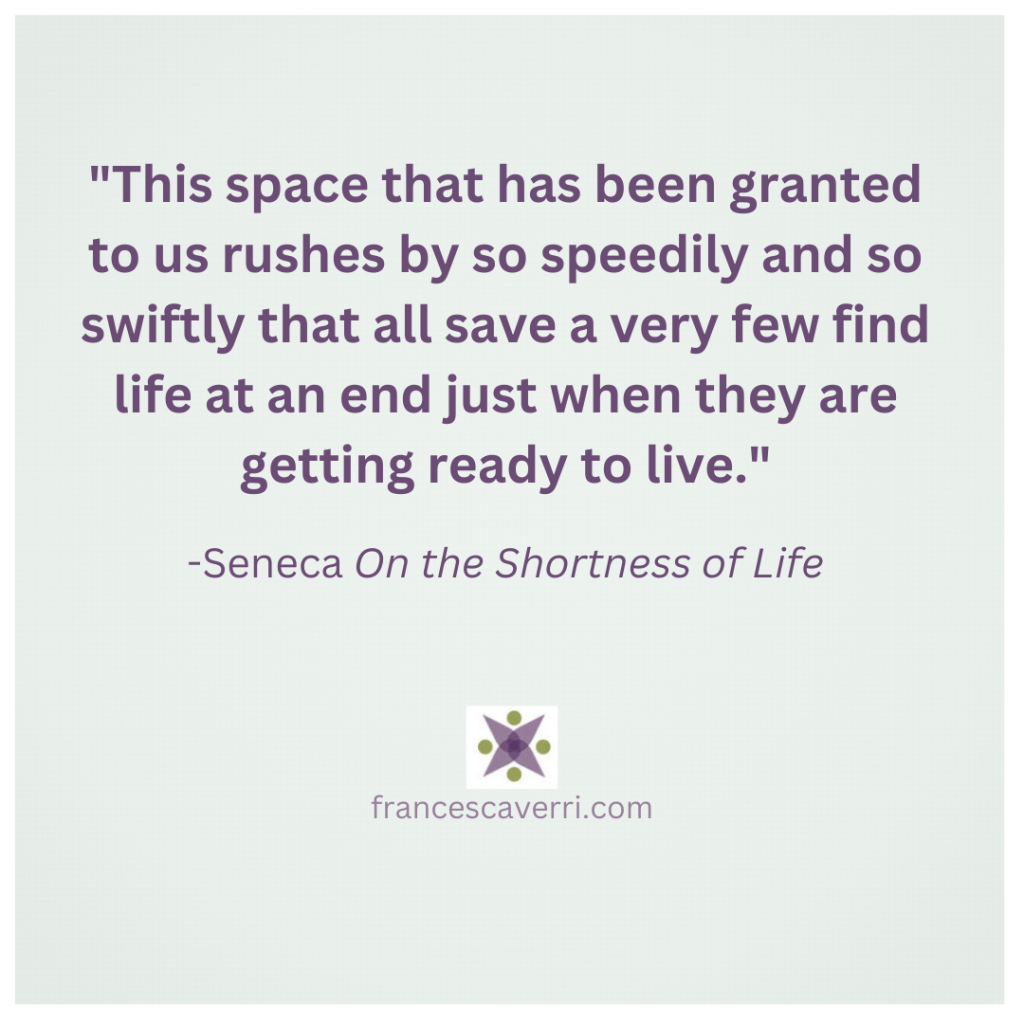Reading the title of this blog might sound a little bit odd coming from a professional organizer who, for the last 20+ years, has written and taught others about productivity and the many ways to be more efficient and effective. I have shared with others how to manage their time better, accomplish day-to-day routines with ease, and eat an elephant.
And now I am telling you that all of those things are important. But not what is most important.
I will be honest that I didn’t just wake up one day and think that all of the things I have learned, and taught about with productivity, time and its management are hogwash. They actually aren’t. But after reading just one chapter of Oliver Burkeman’s book Four Thousand Weeks I am starting to see there is more to this hyped-up thing we call productivity.
In fact, the caveat to “productivity is a waste of time” is a big one.
Burkeman’s book posits that the human lifespan is “absurdly, terrifyingly, insultingly short”. And that on average, if you live to about 80, you will live for about 4000 weeks. In the scheme of things, that does sound…insultingly short. And that is because it really is. You hear people talk all the time about life being short. But I often wonder why, if they believe it as such, they don’t make the necessary changes to live it more fully.
And that is where the caveat lies.
Productivity is a waste of time if you don’t use the beneficial result of being more productive to live your life well.
I think the question to ask in order to know if you are using the skill for “good” is why do you want to be more productive? Is it to “get things done”? To be more accomplished, or just be seen as more accomplished? Is it so you can check things off a to do list, only to be able to add more to that list?
Or is it so you can use your time to live well, and feel happy?
There is nothing wrong with wanting to be productive. But knowing the root reason for the desire is important. Otherwise, you will be chasing a goal that is almost impossible to attain thoroughly. After all, the more productive you are, the more you are asked to do. Or the more you ask of yourself. And the cycle continues leaving you never quite feeling all that productive.
I will admit, being productive makes me feel good. Especially if I have moved the needle on a project that I know helps me be more effective. And in turn helps others do the same. In fact, productivity in this way helps me reach life goals – one of which is to be able to put out content like this. I want to help people.
But what it really does is allow me to create space.
It allows me to be more deliberate in how I am spending my 4000+ weeks.
I am suggesting that if the goal of your productivity has its root in creating space, you, too, can be more deliberate as well.
Create space not so you can then fill it unnecessarily with more tasks and to dos. Use it to make room so you can breathe more. So you can think, contemplate, and dream.
Create space so that you become more aware of what thoughts, things, and people add something positive to your life.
Allow the space that’s created to help you create more. Let it help you do more of the things that make you feel alive, and open you up to try things that make you happy or feel impactful.
That is what living a life you love is about.

Maybe instead of asking how we can be more productive, we should ask “How will I use the space that is created by being more productive”?
In other words, if you’re going to aim to have more productivity, know what you are going to do with the sanity that’s created. What will you do with the space?
How will you live your life?
The world is bursting with wonder, and yet it’s the rare productivity guru who seems to have considered the possibility that the ultimate point of all our frenetic doing might be to experience more of that wonder. [It is time] to see if we can’t discover, or recover, some ways of thinking about time that do justice to…the outrageous brevity and shimmering possibilities of our four thousand weeks.” – Oliver Burkeman
Of course, there is pain in doing this work. Anything truly worth it seemingly comes with that kind of challenge. There is pain in confronting how limited your time is. And pain in accepting your limited control over the time you get (Burkeman, pg 30). And that is why it is so important to choose wisely. Instead of pushing “ourselves harder, chasing fantasies of the perfect work-life balance [and implementing] time management systems that promise to make time for everything,” maybe we should make the tough choices.
Not everything you dreamed might happen will.
And that is okay. In fact, knowing this gives you permission to let go of filling your mind and time with busyness that sometimes acts as a way “to numb [yourself] emotionally”. (Burkeman, p.30).
Productivity, like any other skill, can offer you good and bad. It can pull you in and leave you feeling as though you can never do enough in order to be enough.
Or it can open you up to the infinite possibilities available to you when you create the space to see them.
It’s your choice.




